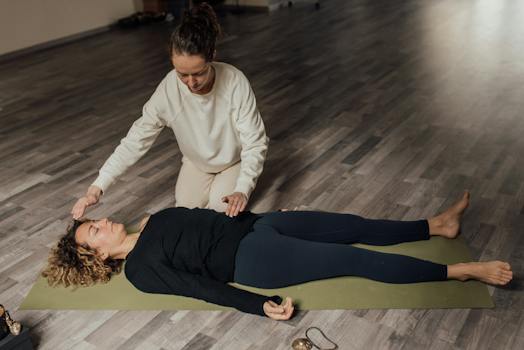-
Table of Contents
Stay Calm, Breathe Deep, Reflect: Find tranquility within.
Introduction
Stay Calm, Breathe Deep, and Reflect is a practice that encourages individuals to cultivate a sense of calmness, focus on their breath, and engage in introspection. This approach aims to promote emotional well-being, reduce stress, and enhance self-awareness. By incorporating these three elements into our daily lives, we can develop a greater sense of inner peace and clarity, allowing us to navigate challenges with a more centered and grounded mindset.
The Importance of Staying Calm in Stressful Situations
Stay Calm, Breathe Deep, and Reflect
In today’s fast-paced world, stress has become an inevitable part of our lives. Whether it’s work-related pressure, personal challenges, or unexpected events, we often find ourselves in stressful situations. However, it is crucial to understand the importance of staying calm in such circumstances. By maintaining a sense of calmness, we can navigate through these challenges more effectively and make better decisions. In this article, we will explore the significance of staying calm in stressful situations and how it can positively impact our lives.
When faced with a stressful situation, our natural response is often to panic or become overwhelmed. However, reacting impulsively can lead to poor decision-making and exacerbate the problem at hand. By staying calm, we allow ourselves the opportunity to think clearly and rationally. This state of mind enables us to assess the situation objectively and consider all possible solutions. Taking a step back and reflecting on the issue at hand can provide us with a fresh perspective and help us find the most appropriate course of action.
Moreover, staying calm in stressful situations allows us to maintain control over our emotions. When we let stress take over, our emotions can cloud our judgment and lead to impulsive reactions. By remaining calm, we can prevent ourselves from saying or doing things we may later regret. This self-control not only helps us in the immediate situation but also contributes to our overall emotional well-being. By managing our emotions effectively, we can reduce the negative impact of stress on our mental and physical health.
Another benefit of staying calm in stressful situations is the positive influence it has on those around us. When we remain composed, we inspire confidence in others and create a sense of stability. This can be particularly important in leadership roles or when dealing with a team. By staying calm, we encourage others to follow suit and approach the situation with a level head. This collective composure can foster a more collaborative and productive environment, leading to better outcomes for everyone involved.
Furthermore, staying calm allows us to tap into our problem-solving abilities. When we are stressed, our minds tend to focus on the problem itself rather than potential solutions. By maintaining a calm demeanor, we can shift our attention towards finding solutions and taking proactive steps. This ability to think critically and problem-solve is invaluable in navigating through challenging situations and overcoming obstacles.
To stay calm in stressful situations, it is essential to practice self-care and adopt healthy coping mechanisms. Deep breathing exercises, for example, can help regulate our heart rate and induce a sense of calmness. Taking a moment to pause, breathe deeply, and reflect on the situation can provide us with the clarity we need to move forward. Additionally, engaging in activities that promote relaxation, such as meditation or physical exercise, can help reduce stress levels and enhance our ability to stay calm.
In conclusion, staying calm in stressful situations is of utmost importance. By maintaining a sense of composure, we can think clearly, make better decisions, and manage our emotions effectively. Staying calm also has a positive impact on those around us, fostering a collaborative and productive environment. By practicing self-care and adopting healthy coping mechanisms, we can enhance our ability to stay calm and navigate through life’s challenges with grace and resilience. So, the next time you find yourself in a stressful situation, remember to stay calm, breathe deep, and reflect.
How Deep Breathing Techniques Can Help You Relax and Stay Grounded

Stay Calm, Breathe Deep, and Reflect
In today’s fast-paced world, finding moments of calm and relaxation can be a challenge. The constant demands of work, family, and social obligations can leave us feeling overwhelmed and stressed. However, there is a simple yet powerful technique that can help us find peace and stay grounded – deep breathing.
Deep breathing techniques have been used for centuries as a way to promote relaxation and reduce stress. By focusing on our breath and taking slow, deliberate breaths, we can activate the body’s natural relaxation response and bring ourselves back to a state of calm.
One of the key benefits of deep breathing is its ability to slow down our heart rate and lower blood pressure. When we are stressed or anxious, our bodies go into a fight-or-flight response, releasing stress hormones that can increase our heart rate and blood pressure. By practicing deep breathing, we can counteract this response and bring our bodies back into balance.
To practice deep breathing, find a quiet and comfortable place where you can sit or lie down. Close your eyes and take a moment to tune into your body and your breath. Begin by taking a slow, deep breath in through your nose, allowing your belly to expand as you fill your lungs with air. Hold the breath for a few seconds, and then slowly exhale through your mouth, letting go of any tension or stress. Repeat this process several times, focusing on the sensation of your breath as it enters and leaves your body.
As you continue to practice deep breathing, you may notice that your mind begins to quiet and your thoughts become less scattered. This is because deep breathing activates the parasympathetic nervous system, which is responsible for promoting relaxation and rest. By engaging this part of our nervous system, we can shift our bodies out of the stress response and into a state of calm.
In addition to its physical benefits, deep breathing can also help us gain clarity and perspective. When we are stressed or overwhelmed, our minds can become clouded with negative thoughts and worries. By taking a few moments to focus on our breath, we can create space for reflection and gain a clearer understanding of our thoughts and emotions.
Deep breathing can be especially helpful during times of high stress or anxiety. Whether you’re facing a challenging work deadline or dealing with a personal crisis, taking a few minutes to practice deep breathing can help you regain control and approach the situation with a calmer mindset. By incorporating deep breathing into your daily routine, you can build resilience and develop a greater sense of inner peace.
In conclusion, deep breathing techniques are a powerful tool for relaxation and stress reduction. By focusing on our breath and taking slow, deliberate breaths, we can activate the body’s natural relaxation response and bring ourselves back to a state of calm. Whether you’re looking to lower your heart rate, gain clarity, or simply find a moment of peace, deep breathing can help you stay grounded in today’s fast-paced world. So, the next time you’re feeling overwhelmed, remember to stay calm, breathe deep, and reflect.
The Power of Reflection: How Taking Time to Reflect Can Improve Your Well-being
Stay Calm, Breathe Deep, and Reflect
In today’s fast-paced world, it can be easy to get caught up in the hustle and bustle of everyday life. We are constantly bombarded with information, tasks, and responsibilities, leaving little time for self-reflection. However, taking the time to reflect on our thoughts, actions, and experiences can have a profound impact on our well-being.
Reflection is the process of thinking deeply about our experiences, emotions, and beliefs. It involves stepping back from the chaos of our lives and creating a space for introspection. By engaging in reflection, we can gain a deeper understanding of ourselves, our relationships, and the world around us.
One of the benefits of reflection is that it allows us to gain perspective. When we are caught up in the daily grind, it can be difficult to see the bigger picture. Reflection provides us with an opportunity to step back and evaluate our lives from a distance. It allows us to see patterns, identify areas for growth, and make more informed decisions.
Moreover, reflection can help us process our emotions. Life is full of ups and downs, and it is important to acknowledge and understand our feelings. By taking the time to reflect, we can explore the root causes of our emotions and develop strategies for managing them. This can lead to increased emotional intelligence and a greater sense of well-being.
Additionally, reflection can enhance our self-awareness. When we take the time to reflect, we become more attuned to our thoughts, beliefs, and values. This self-awareness allows us to align our actions with our true selves and live a more authentic life. It also enables us to recognize and challenge any negative thought patterns or limiting beliefs that may be holding us back.
Furthermore, reflection can improve our relationships. By reflecting on our interactions with others, we can gain insight into our communication styles, strengths, and areas for improvement. This self-awareness can lead to more effective and meaningful connections with others. It also allows us to identify any toxic relationships or dynamics that may be negatively impacting our well-being.
In order to incorporate reflection into our lives, it is important to create dedicated time and space for this practice. This can be as simple as setting aside a few minutes each day to sit quietly and reflect, or as elaborate as going on a weekend retreat. The key is to find a method that works for you and commit to making reflection a regular part of your routine.
When engaging in reflection, it can be helpful to ask yourself open-ended questions. These questions can prompt deeper thinking and exploration. For example, you might ask yourself, “What did I learn from this experience?” or “How did I contribute to this situation?” By asking these types of questions, you can uncover valuable insights and gain a greater understanding of yourself and the world around you.
In conclusion, taking the time to reflect is a powerful tool for improving our well-being. It allows us to gain perspective, process our emotions, enhance our self-awareness, and improve our relationships. By incorporating reflection into our lives, we can cultivate a greater sense of peace, clarity, and fulfillment. So, stay calm, breathe deep, and take a moment to reflect. Your well-being will thank you.
Q&A
1. What is the purpose of staying calm, breathing deep, and reflecting?
The purpose is to promote relaxation, reduce stress, and gain clarity of thought.
2. How can staying calm, breathing deep, and reflecting benefit one’s mental well-being?
These practices can help manage anxiety, improve focus and concentration, enhance self-awareness, and foster emotional stability.
3. What are some techniques for staying calm, breathing deep, and reflecting?
Techniques include deep breathing exercises, mindfulness meditation, journaling, practicing gratitude, and engaging in activities that promote relaxation such as yoga or nature walks.
Conclusion
In conclusion, the practice of staying calm, breathing deep, and reflecting is essential for maintaining emotional well-being and making sound decisions. By staying calm, we can better manage stress and approach challenges with a clear mind. Deep breathing helps to regulate our emotions and promote relaxation. Reflection allows us to gain insights, learn from our experiences, and make more informed choices. Incorporating these practices into our daily lives can lead to improved mental and emotional health, as well as enhanced overall well-being.

